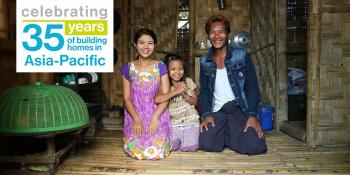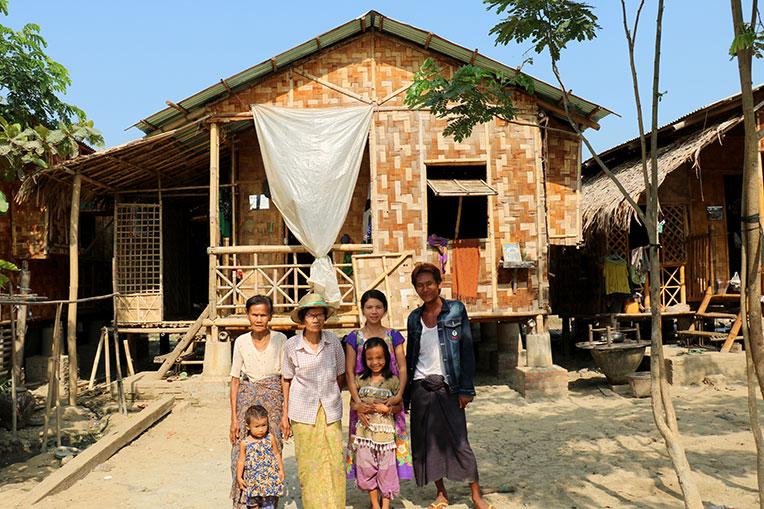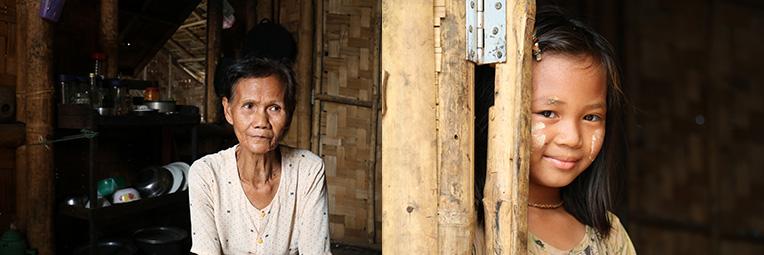
Feeling secure
Daw Tin Aye recalled her distress in 2014 when her family of eight had to relocate from their house in south-central Myanmar to make way for a new road. More than a dozen families were also affected in Min Ywar Tar Wa village, Bago region, where she lived.
Eventually, Daw Tin Aye, 70, and her family resettled on a donated plot of land close to their old house. They were among 16 households who worked with Habitat for Humanity Myanmar to construct bamboo homes. They also received land certificates from the Bago government as a result of Habitat Myanmar’s efforts.
Daw Tin Aye’s family built their home with 20 Habitat volunteers from the United States. Her family members helped by preparing bamboo nails, handling the bamboo, and mixing and pouring cement in the house’s foundation.
“We were very happy! We liked to work with them and we took many pictures together. They were very hardworking, even in the heat,” says Daw Tin Aye’s 28-year-old daughter Bok Bok. “The handover of the house was the most memorable; we held hands, the volunteers were crying and so were we.”
The family moved into their core Habitat home in March 2017. They have the option of extending the house, measuring an average of 23 square meters in size, when they have the means. Daw Tin Aye shares their bamboo home with Bok Bok and another daughter as well as their families.

Daw Tin Aye’s (far left) daughter Bok Bok (second from right) says her family had a memorable time building their home built with Habitat volunteers. Photos: Habitat for Humanity/Ritwik Sawant.
“Our previous house had problems with mold and insects,” says Bok Bok. As the roof was made of palm leaves, rainwater would come in through the gaps and the family could not sleep. Her husband Pyae Phyo, a 28-year-old handyman, also cited the lack of space in their one-room old house. Without access to water and sanitation facilities, they had to defecate in the open.
The family earns an average of 30 Myanmar kyats (2 U.S. cents) from rolling cigars at home and selling those to the local factory. Between Daw Tin Aye, her older sister Daw Kyu and Bok Bok, they can roll about 1,500 cigars daily.
Still, they could not afford the cost of annual house repairs. “We had to borrow more than 150,000 kyats (more than US$100) every year to fix the house. But for most of the problems, we could only cover with plastic sheets,” says Pyae Phyo. “Whenever there was flooding, we had to seek refuge in the local school or monastery. We were very upset,” he adds.
Now the family is delighted with their new home. They even built a porch on the side. Daw Tin Aye says: “During the hot season, we are safe from the sun. When it rains, water doesn’t come into the house.” Like the other Habitat homeowners, Daw Tin Aye’s family has a new latrine that has been built with a subsidy from the local government.
The younger members of the family are also feeling the effects of a safe, stable home. Bok Bok’s daughter Shwe Yati, 7, likes playing with her cousins Phone Dhu Raya Linn, 6, and Htet Htet, 2. “Now they have space to play and draw pictures in the house. The kids are happy and becoming healthier,” shares Bok Bok. “The girls like the verandah for relaxing, talking to neighbors and seeing the stars and the moon at night.”

Daw Tin Aye (left) says her home protects her family from the sun and rain while her granddaughter Shwe Yati (right) likes to hang out on the veranda with her cousins.
Daw Tin Aye is also thinking ahead. “We want to make jewelry in the future. We like this community. And we are thankful for Habitat’s support.”
In a five-year partnership with Nissan, Habitat Myanmar will build a total of 95 flood-resilient bamboo homes in Thanatpin town, Bago region. Daw Tin Aye is among the families in 15 villages who will have decent housing and improved access to clean water and safe sanitation along with training in construction, sanitation and hygiene.
Find out more about Habitat’s work and our supporters through our e-newsletter, the Asia-Pacific Update. Subscribe now.